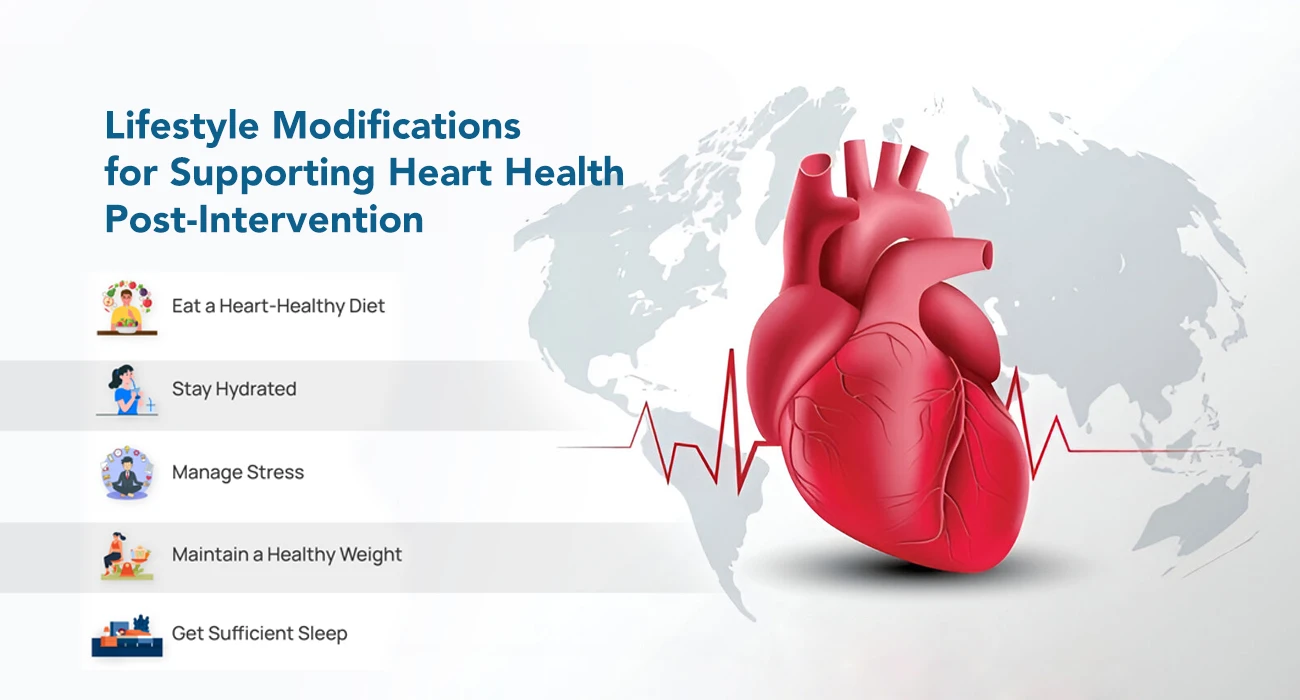Lifestyle Modifications for Supporting Heart Health Post-Intervention
02/17/2024
Heart-healthy lifestyle changes include eating heart-healthy foods, exercising regularly, quitting smoking, getting enough good-quality sleep, maintaining a healthy weight, having your blood pressure and cholesterol checked, and managing your blood sugar. Consuming a lot of saturated and trans-fat-rich foods may increase your risk of developing heart disease. Eating fiber-rich meals with minimal saturated fat, trans fat, and cholesterol can help avoid high cholesterol. Limiting salt (sodium) in your diet can also help lower your blood pressure.
This blog provides practical lifestyle changes for a healthier future after cardiac intervention. It explores the five foundations of heart health: nourishing the body, moving with joy, managing stress wisely, quitting smoking, and practicing careful restraint with alcohol. It's important to remember that you're not alone on this journey.
1. Food
- Embrace the Mediterranean Diet, which includes fruits and vegetables, whole grains, lean proteins (fish and poultry), and healthy fats. Limit saturated and trans fats, red meat added sugars and sugary beverages. Imagine your plate as a colorful painting rather than a fight for harmful choices!
- Go Green and Colorful: Aim for 5 or more servings of fruits and vegetables per day. Explore a variety of selections, including leafy greens, berries, citrus fruits, and bright bell peppers.
- Whole Grain Wonders: For long-lasting energy and fiber, avoid processed carbohydrates and instead choose whole-wheat bread, brown rice, quinoa, and oatmeal.
- Portion control is key: Use smaller plates, calculate your portions, and minimize mindless munching. Remember that even nutritious meals can contribute to weight gain when consumed in excess.
- Lean Protein: Choose skinless chicken, omega-3-rich fish (such as salmon and tuna), beans, lentils, and low-fat dairy products.
- Healthy Fat: Add nuts, seeds, and olive oil for vital fats and flavor. Don't forget avocados!
- Limit the unhealthy food: Reduce your intake of saturated and trans fats from processed foods, red meat, and fried foods. Reduce your intake of added sugars and sugary drinks by drinking water, unsweetened tea, or fruit-infused water instead.
- Downsize Your Plates: Use smaller plates to deceive your brain into feeling full with less food. Use measuring cups and spoons, especially for high-calorie foods like nuts and oils.
- Mindful munching: avoid mindless nibbling. Plan healthful snacks, such as fruits, vegetables, or yogurt with almonds, and enjoy every bite.
2.Be Active
- Aim for 150 minutes a week of brisk walking, swimming, or dancing—anything that gets your heart rate up for at least 30 minutes most days of the week will work wonders. Start slowly and progressively increase the intensity and duration.
- Find activities you enjoy: Exercise does not need to be a chore. Discover activities that you enjoy, such as joining a sports team, attending group fitness classes, or exploring nature with friends. 150 minutes of active bliss.
- Find Your Fit: Select activities that you enjoy, such as vigorous walking, dancing, swimming, cycling, or team sports. Get creative and try new things!
- Start slowly and gradually: Don't overburden yourself. Begin with shorter workouts and progressively increase the intensity and time as you gain fitness.
- Short but effective activities: Short spurts of movement throughout the day are important! Take the stairs, park further away, or engage in short activity breaks during work.
3.Stress Management
- Mindfulness Matters: Spend 10–15 minutes per day doing meditation, yoga, or deep breathing exercises.
- Stress Reduction: Exercise is a natural stress reducer. Combine it with mindfulness to get an extra boost.Stress is a silent killer of the heart. To cope with daily stress, use relaxation techniques such as yoga, meditation, or deep breathing exercises. Consider attending a support group or speaking with a therapist for extra advice.
- Connect and Confide: Speak with a therapist or join a support group to share your struggles and get encouragement.
- Nature’s Care: Spend time outdoors, whether it's a walk in the park or gardening.
- Create a Cool, Calm Environment: To get the best sleep, make sure your bedroom is cool, dark, and silent.Avoid using screens for at least an hour before bedtime, and dim the lights to indicate weariness.
- Prioritize Sleep: Aim for 7-8 hours of good sleep per night. Create a peaceful evening routine, avoid using electronics before bed, and stick to a consistent sleep schedule.
4. Quit Smoking
- Smoking is an alarming risk factor for cardiovascular disease. If you smoke, quitting is the single most beneficial thing you can do for your heart.
- Seek support: Join a smoking cessation program, consult your doctor, or look into drugs to help you quit.
- Identify triggers: Recognize situations that make you want to smoke and consider healthier alternatives.
- Reward yourself: Celebrate accomplishments and progress with non-smoking incentives such as hobbies or experiences.
5. Alcohol Consumption
- Excess alcohol consumption can harm your heart. Limit your alcohol intake to one drink per day for women and two for men.Keep in mind Remember,One sip, not a slip.Healthy alternatives include water, unsweetened tea, and sparkling water with a splash of fruit juice.
Conclusion
Consistency is key. Do not get discouraged by setbacks. Every healthy choice, no matter how modest, improves your long-term heart health.Work with your healthcare team. They are your partners on this journey. Discuss your goals, challenges, and successes regularly.Celebrate your victories. Recognize and praise yourself for implementing favorable improvements. Your heart will thank you.By embracing these lifestyle changes, you may strengthen your heart and enjoy a bright, healthy future. Remember that you're not alone on this road.

